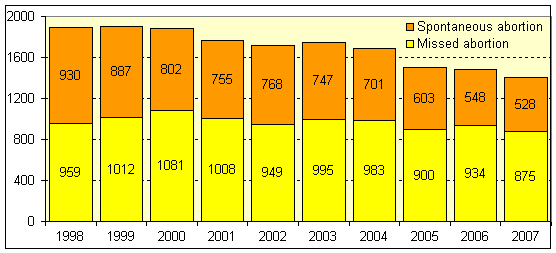
Miscarriages, 2nd trimester
1998-2007 (Updated April 5,
2008)
2nd trimester spontaneous abortions and missed abortions
1998-2007
Resopnsible Christina H Vestergaard and ějvind Lidegaard
1.0 Miscarriages second trimester 1998-2007. N = 16,965

Same in per cent
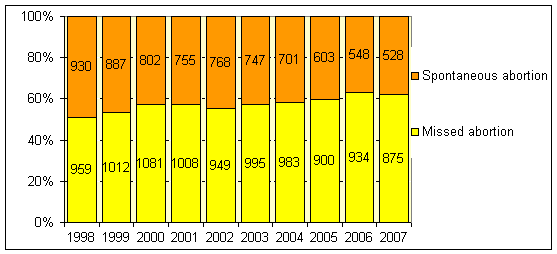
Comments: The number of 2nd trimester
miscarriages has decreased with 26% from 1998 to 2007.
It is primarily spontaneous abortions which have decreased (with 43%). During
the same decade,
missed abortions have increased their share of miscarriages from 51% in 1998 to
62% in 2007.
1.2 Spontaneous abortion 2.
trimester 1998-2007. N = 7,269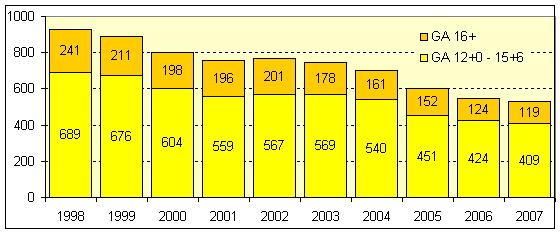
Comments: The overall 43% reduction
in 2nd trimester spontaneous abortion has been most
pronounced for the late 2nd trimister abortions, but is also stricking for the
early 2nd trimester
abortions.
1.3 Surgical evacuation rate (%)
after 2. trimester spontaneous abortion with a
gestational age of 12+0 to 15+6. N = 5,488,
n = 3,628
Evacuation rate in per
cent at top of each column, absolute number of evacuations inside below.
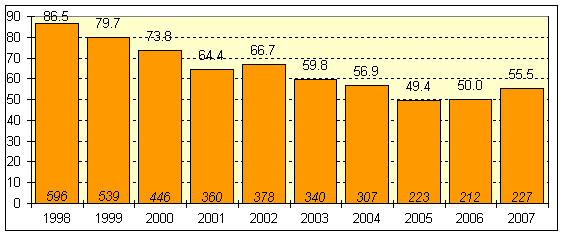
1.4 Surgical evacuation rate (%)
after 2. trimester spontaneous abortion with a
gestational age of 16 weeks or longer. N =
1,781, n = 1,066
Evacuation rate in per
cent at top of each column, absolute number of evacuations inside below.
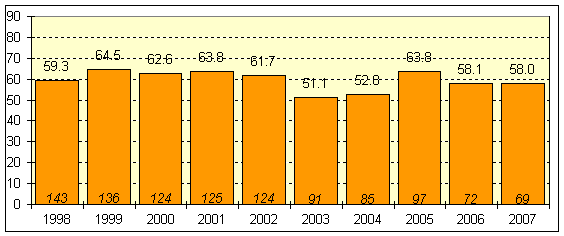
Comments: For the early 2nd trimester
abortions, the evacuation rate has declined significantly
from 87% in 1998 to 56% in 2007, however no reduction has been seen since 2004.
The the late 2nd trimester spontaneous abortions, the evacuation rate has been
more stable around
60%. In contrast to previously, the evacuation rate today is higher for the late
than for the early spon-
taneous 2nd trimester spontaneous abortions.
1.5 Evacuation rate (%) after 2nd
trimester spontaneous abortion at different
departments in 2007. N = 528, n = 296.
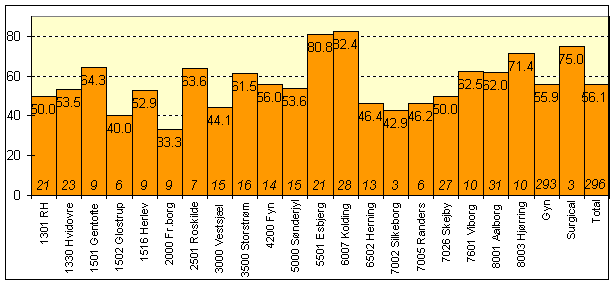
Comments: Despite small figures at some
departments, the practice at each department is surprisingly
stable over years, and range from 33% in Frederiksborg to 82% in Kolding.
This difference
is probably primarily due to different professional views on this practice,
rather than to differences in clinical
appearance of the women with spontaneous abortions. The wide span suggest that
we could abstain from
many of these evacuations. If all departments had a practice as in
Frederiksborg, 122 of the 296 conducted
evacuations or 41% could have been avoided.
1.6
Evacuation rate (%) after 2nd trimester missed abortions in Denmark 1998-2007.
N = 9,696, n = 4,722
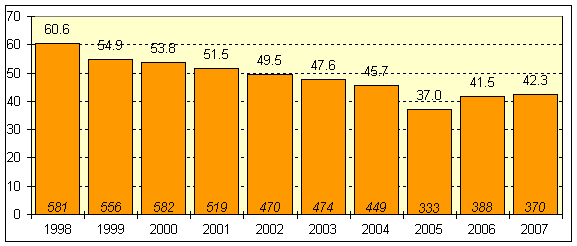
Comments: The evacuation rate reached a minimun of 37%
in 2004, and has since then increased
after six years of constant fall. The evacuations include primary evacuations as
well as evacuations
after medical treatment.
1.7 Evacuation rate (%)
after 2nd trimester missed abortion at different departments
in 2007. N = 873, n = 369.
Absolute number of evacuations indicated in bottom of each
column.
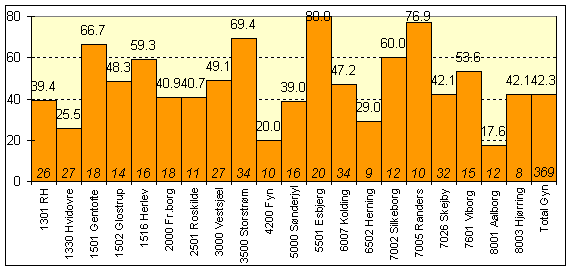
Comments: The evacuation rate after 2nd trimester missed abortion range
from 17.6% in Fyn to
80% in Esbjerg. It is not possible to specify the best practice, but the large
variations again probably
reflects differences in clinical opinion rather than differences in patient
characteristics.
There is only a weak association between the evacuation rate after spontaneous
abortion and the
evacuation rate after missed abortion at different departments.